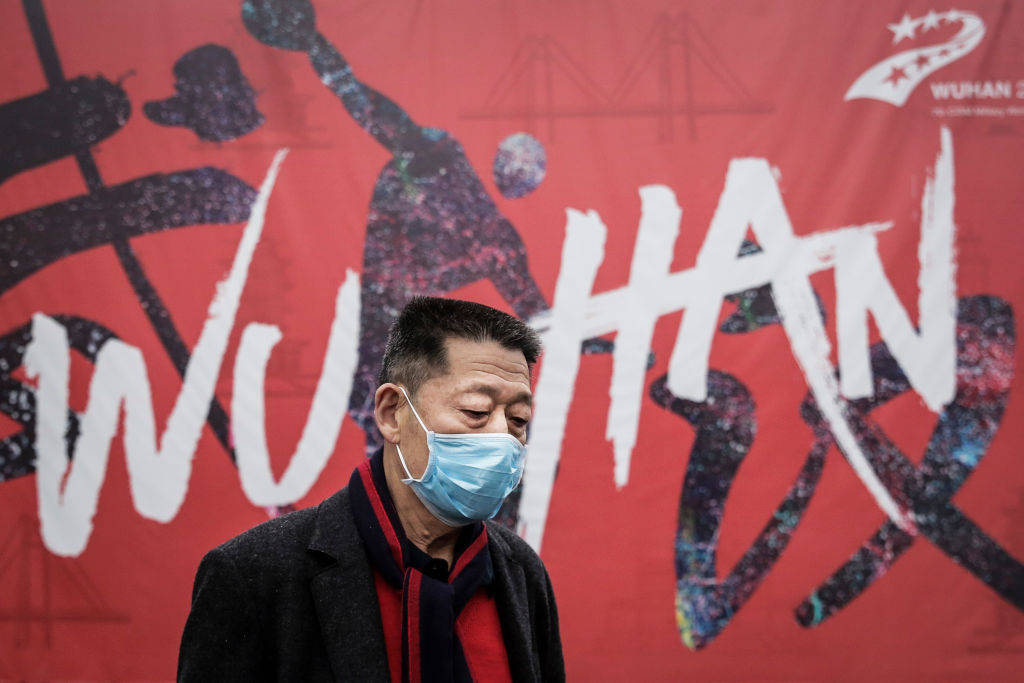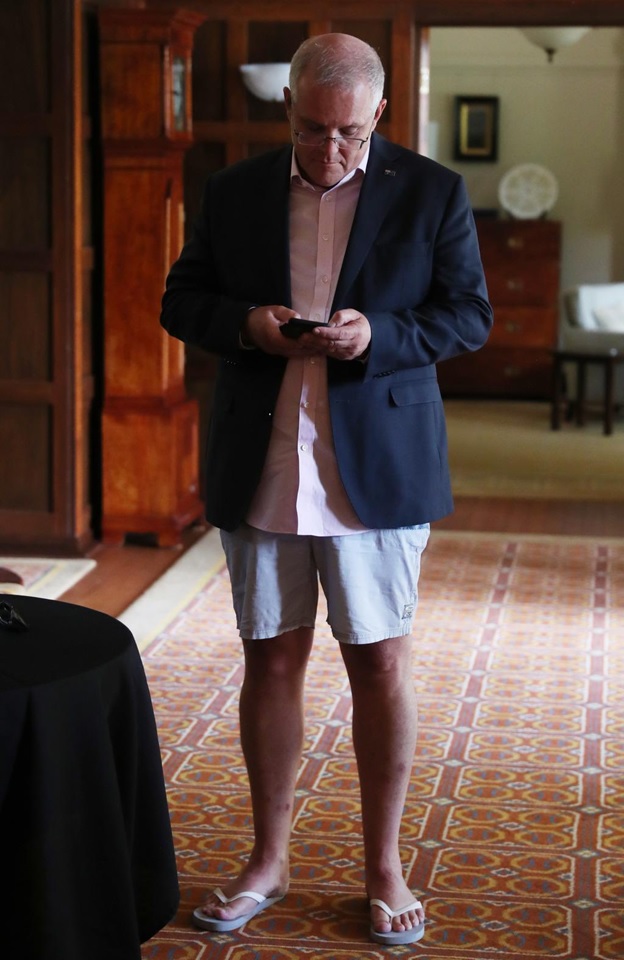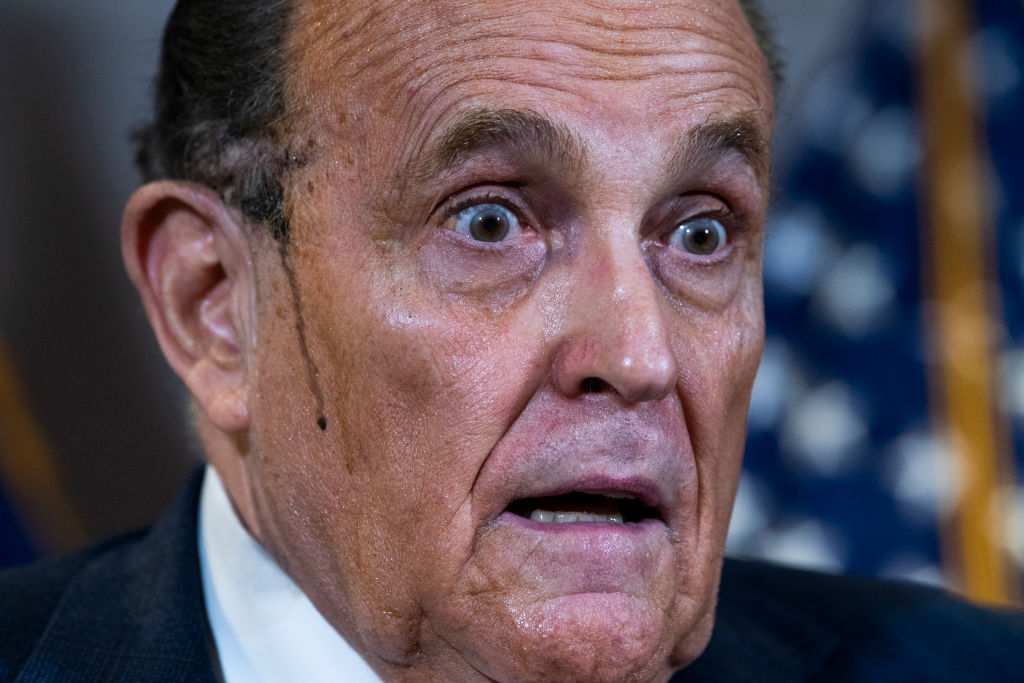
In the Covid era of gloom, doom and Zoom, Australia’s prime minister went to summit meetings while doing 14 days quarantine. And the lockdown PM fronted the cameras with board shorts and thongs just out of camera shot.
What became normal in an abnormal year introduces the annual Madeleine Award for the use of symbol, stunt, prop, gesture or jest.
The Madeleine is inspired by the former US secretary of state and ambassador to the UN, who sent diplomatic messages via her lapel brooches.
Rather than ‘read my lips’, Madeleine Albright’s messaging was ‘read my pins’. Her favourite mistake was wearing a trio of monkey brooches to meet Vladimir Putin, causing the Russian to go ape.

Over its dozen years, the Madeleine Award has spawned several minor prizes. First up, the Diana on ‘the utility and force of photographs’, named for Diana, Princess of Wales, a princess who understood pics: ‘As Diana used to say, the picture is what counts’, former UK prime minister Tony Blair wrote.
The Diana goes to that image of Scott Morrison doing virtual business during virus. Up top, the business shirt and coat, but below the belt—well, all bets are off, just like the belt. The prime minister clarified: ‘Just FYI, they’re boardies, not PJ shorts.’ So dress code for the G20 or APEC is yes to board shorts but no to pyjama shorts.
Strange times, indeed.
Which leads to the OOPS! Award for blooper and blunder, also known as a ‘Boris’, saluting a British prime minister who proves blunders needn’t define careers. When sacked from shadow cabinet, many moons ago, Boris Johnson commented: ‘There are no disasters, only opportunities. And, indeed, opportunities for fresh disasters.’ It seems so right that this year’s Boris is for a runaway hair crash.
The OOPS! goes to the melting moment suffered by US President Donald Trump’s lawyer, Rudy Giuliani, as hair dye, or maybe mascara, ran down his face during a press conference. Here was hair malfunction as metaphor for the melting of the Trump presidency. Ageing leaders around the world shuddered: ‘There but for the grace of God, and my hairdresser, go I.’

In politics, a lot of dyeing goes on. In his memoir, Trump’s predecessor Barack Obama notes the black-hair fixation in Beijing (‘as far as I could tell, few Chinese leaders turned gray as they aged’) and on a 2009 meeting with Saudi Arabia’s King Abdullah, ‘an octogenarian with a jet-black moustache and beard (male vanity seemed to be a common trait among world leaders)’.
Now for the Orwell prize for double-think and euphemism (North Korea is barred from this category, because it’d win most years). China gets the gong for denying that it’s sending Uyghurs to gulags, instead claiming Muslims are going to ‘vocational education and training centres’ for ‘re-education’. See ASPI’s Xinjiang Data Project, which is Orwellian in the noblest sense (rigorous analysis, tightly written).
As Trump leaves the White House, George Orwell’s pronouncement in his 1946 essay ‘Politics and the English language’ resonates anew: ‘Political language—and with variations this is true of all political parties, from Conservatives to Anarchists—is designed to make lies sound truthful and murder respectable, and to give an appearance of solidity to pure wind.’
The Donald’s presidency has lived out Private Eye’s prediction on the president’s inauguration in January 2017. The Eye’s cover picture of Trump taking the oath of office had these words coming from his mouth: ‘I swear to tell the post-truth, the alternative truth and nothing like the truth.’ Some jibes go straight to the truth. In the history of the Trump presidency, the manner of his leaving will be a dark scar serving as a final, dark exclamation point.
The Madeleine Award’s focus on symbol, stunt, prop, gesture or jest means political protests are often in the running. Singapore gets a mention for charging an activist with violating the public-order law by holding up a sign with a smiley face. In Singapore, brandishing a smiley face in front of a police station is no laughing matter.
In Thailand’s battle royal (the king versus his people) the three-finger salute from The Hunger Games has become a gesture of resistance and call for democracy (a potent makeover for the boy scout/girl guide salute). Large inflatable yellow ducks also serve as playful symbols—and shields against water cannon. Thailand’s democracy battle happens on both streets and screens: see ASPI’s Quicktake on how activism is shaped and amplified by social media and digital activism—and the pushback, using the same tools, by the government and military.
The 12th annual Madeleine, however, doesn’t go to a smiley face, a salute or a duck.
The emblem of a dire year must be—drum roll, please—the face mask.
In the face of the global virus, masking has gone viral around the world.
A response to pandemic, the mask has become personal and political; a health measure for protection and precaution now has social meaning and often legal weight. That’s quite a load for two loops over the ears and a piece of material across the nose and mouth.
Australian researchers writing a book on the face mask during Covid say it’s part of a culture of decoration, fashion and self-expression, with customised face masks available for bridal wear, footy matches, birthdays, baptisms, bar and bat mitzvahs, first communions and even funerals.
The 12th Madeleine Award goes to the face mask as a sign of our times, along with some typical wisdom from Madeleine Albright: ‘I am an optimist who worries a lot.’
As La Madeleine would say, embrace the job and the joy, not the jingoism—and wash your hands!

